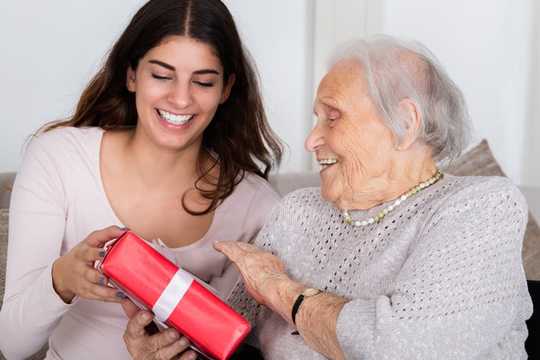 Alex Trebek pictured in Pasadena, California on May 5, 2019. Richard Shotwell/Invision/AP
Alex Trebek pictured in Pasadena, California on May 5, 2019. Richard Shotwell/Invision/AP
Long-time “Jeopardy!” host Alex Trebek announced in March that he had been diagnosed with stage 4 pancreatic cancer. Within days, he offered thanks to “the hundreds of thousands of people who have sent emails, texts, tweets, and cards wishing me well regarded my health.” Then last month, Trebek reported that his cancer was in “near remission,” saying that his doctors “hadn’t seen this kind of positive results in their memory.”
Although the odds remain stacked against Trebek (advanced pancreatic cancer has a 3% 5-year survival rate), his experience raises an intriguing question: What are the benefits of such well wishes?
Greeting card industry statistics amply demonstrate the relevance of the question to most Americans: We buy about 6.5 billion greeting cards a year, and while birthdays constitute the number one occasion, “Get Well” cards figure heavily in the mix.
Benefits for recipients
 Spending time with someone who is old, sick or restricted to home can break social isolation. Andrey_Popov/Shutterstock.com
Spending time with someone who is old, sick or restricted to home can break social isolation. Andrey_Popov/Shutterstock.com
The most immediately apparent benefits of well wishes accrue to recipients. When we are injured, sick or suffering, knowing that someone else is thinking about us can be a source of comfort. It counteracts one of the worst aspects of suffering – isolation. During periods of convalescence, we often miss school or take time off from work and other social activities, which leaves us feeling alone. Knowing that we are in someone else’s thoughts helps to counteract this.
When such well wishes are accompanied by offers of assistance, they can help to solve everyday challenges. Co-workers might offer to assume work responsibilities so that a colleague can take the time needed to get better. Neighbors might offer to feed a convalescent’s pets, to deliver groceries or to help with household chores or self-care. Relatives might offer to stay with loved ones, or even bring them into their own homes to provide care.
Prayer offers perhaps the most dramatic opportunity to study the health benefits of well wishes. In studies of the efficacy of prayers for others, some studies have shown small health benefits, while others have shown no effect.
As a practicing physician who teaches large numbers of medical students and residents, I believe that sharing well wishes benefits us in all sorts of ways that are not reflected in medical outcomes. For example, reaching out to others can reduce anxiety and fear, and connections formed during difficult times may persist for many years, even a lifetime.
Benefits for well wishers
Wishing others well is also good for the person doing the well-wishing. For one thing, we cannot genuinely do so without shifting our attention away from ourselves. Much unhappiness can be traced to an excessive preoccupation with self, which for some can reach the point that we become curved in on ourselves. Thinking of others counteracts this. There is neurological evidence that acts of generosity make us feel less anxious and happier.
People who feel disconnected from others suffer health consequences worse than obesity, smoking and high blood pressure. By contrast, wishing others well helps us to recognize our interdependence, thereby fostering a greater sense of connectedness. We tend to invest more of our own time and energy in others when we stop and contemplate how much our well-being – economic, social, psychological and spiritual – hinges on theirs.
Of course, there is a trap here that needs to be recognized and avoided. We cannot genuinely wish others well if we are doing it for our own sake. Merely to appear to others to have their best interests at heart while really pursuing our own is but a form of deception, only compounding the adverse effects of self-centeredness and isolation. To realize real benefits from caring for others, we must genuinely care for them.
Benefits for all
 Supporting one another through difficult times can be good for both parties. BRAIN2HANDS/Shutterstock.com
Supporting one another through difficult times can be good for both parties. BRAIN2HANDS/Shutterstock.com
It is so important to care for others that we should do it, at least in some cases, even when it redounds to our detriment. For example, marriage, parenting and friendship involve sacrifices. Sometimes we set aside our own good entirely to tend to the needs of another. While we may not benefit directly from such sacrifices, we do help to build larger wholes – relationships and communities – of which we are all a part. We make the world a better place.
The need to foster mutual care has perhaps never been greater. When Americans were asked in 1985 to say how many people they were close to, the typical response was three. By 2004, this number had dropped to zero. Over one-quarter of us reported that we have no one we consider a close friend.
I knew a physician who once met a patient with end-stage skin cancer in the emergency department. When it became clear that the patient had no place to go and no one to care for her, the physician, who had once been a nun, brought the patient into her own home, where she, her husband and their two sons cared for the woman around the clock during the last few weeks of her life. When such stories are shared, they can inspire our own resolve to do more to care more for those in need.
The recent outpouring of well wishes for a television game show host – a stranger to most who reached out to him – offers an important insight into what makes families, friendships and communities thrive. Connectedness and its benefits are not something we should take for granted. Whether in the form of a simple text message or greeting card – or better yet, a phone call or a visit – letting someone who is hurting know that we care can make a big difference for all.
About The Author
Richard Gunderman, Chancellor's Professor of Medicine, Liberal Arts, and Philanthropy, Indiana University
This article is republished from The Conversation under a Creative Commons license. Read the original article.

Books Improving Attitude and Behavior from Amazon's Best Sellers list
"Atomic Habits: An Easy & Proven Way to Build Good Habits & Break Bad Ones"
by James Clear
In this book, James Clear presents a comprehensive guide to building good habits and breaking bad ones. The book includes practical advice and strategies for creating lasting behavior change, based on the latest research in psychology and neuroscience.
Click for more info or to order
"Unf*ck Your Brain: Using Science to Get Over Anxiety, Depression, Anger, Freak-Outs, and Triggers"
by Faith G. Harper, PhD, LPC-S, ACS, ACN
In this book, Dr. Faith Harper offers a guide to understanding and managing common emotional and behavioral issues, including anxiety, depression, and anger. The book includes information on the science behind these issues, as well as practical advice and exercises for coping and healing.
Click for more info or to order
"The Power of Habit: Why We Do What We Do in Life and Business"
by Charles Duhigg
In this book, Charles Duhigg explores the science of habit formation and how habits impact our lives, both personally and professionally. The book includes stories of individuals and organizations who have successfully changed their habits, as well as practical advice for creating lasting behavior change.
Click for more info or to order
"Tiny Habits: The Small Changes That Change Everything"
by BJ Fogg
In this book, BJ Fogg presents a guide to creating lasting behavior change through small, incremental habits. The book includes practical advice and strategies for identifying and implementing tiny habits that can lead to big changes over time.
Click for more info or to order
"The 5 AM Club: Own Your Morning, Elevate Your Life"
by Robin Sharma
In this book, Robin Sharma presents a guide to maximizing your productivity and potential by starting your day early. The book includes practical advice and strategies for creating a morning routine that supports your goals and values, as well as inspiring stories of individuals who have transformed their lives through early rising.


























